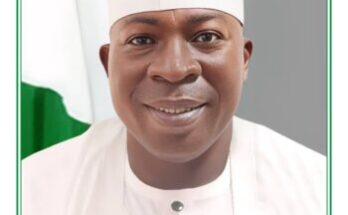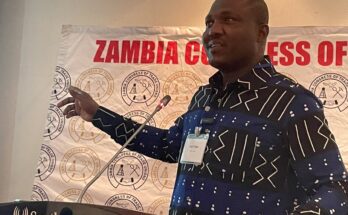Musa Bah Kanawa is a retired staff of the Nigerian National Petroleum Corporation (NNPC); he holds a number of chieftaincy titles including the Barayan Lau. He is the governorship candidate of the Young Democratic Party (YDP) in Taraba state for the March 9 governorship and state assembly elections. In this interview with journalists, Kanawa speaks on his manifesto, including how he would fight poverty and educational backwardness if elected. AYONI M. AGBABIAKA presents excerpts.
What motivated you to run for governor in Taraba state?
I am inspired by the need to save my people from avoidable hardships they have been subjected to over the years. To achieve this, I intend to drive governance in a manner that will give sense of belonging to all and lead to elevation of standard of living generally in Taraba state. This is the main factor motivating my interest in joining the governorship race.
There are allegations or rumours that you have stepped down for this or the other contestant. What is the truth; are you still in the race?
I have also stumbled on such rumours and have even been approached with such overtures a couple of times, which I consider part of normal political process whereby people exercise their freedom of expression. However, the truth remains that I have never contemplated, talkless of withdrawing for another candidate. I am in the race hoping to finish credibly and successfully, by the grace of Almighty God.
So, what exactly are you offering the people of Taraba differently?
All along, Taraba state has been operating devoid of conducive environment for people to meaningfully participate in their socio-economic activities. We are usually offered barrages of lip service on even critical issues calling for decisive actions, thus leaving people with burning desire for development that is never there. At a time of intense ethno-religious tensions such as this, it becomes extremely difficult to talk of meaningful development.
Our government will therefore start tackling under-development by demonstrating sincere commitment to investment in the creation of enabling environment for our people to develop trust amongst themselves and have faith in government. The prevailing atmosphere of excessive mutual distrust amongst the people and against the government, are a serious impediment towards progress.
One of our major tasks is to restore desirable confidence for accelerated progress of our people and the state by ‘working the talk.’ This is because we believe that unless people are stimulated to unleash their potentialities, the clamour for development would remain an unrealisable dream.
We intend to run the government of Taraba state from a four-point agenda, going by our manifesto cascaded from the ideals of our great political party, YDP. First, we have what is tagged ‘Respect for Diversity and Inclusion.’ Here, we have the various communities in the state in mind. Taraba state happens to be a multi-ethnic society with no fewer than 80 different ethnic groups. Unfortunately, there are occasions the politicians mischievously use this against the very people they are intended to lead. Our government will encourage respect for our differences by the people and the government, ensuring that no one is ever denied whatever he deserves from the government on the basis of ethnicity.
There is also the issue of religion and this, like ethnicity, is being used at will to divide the people and create chaos. So many lives and properties have been and still being lost to ethno-religious crises in the state. As a government, we intend to create enabling environment by actually committing to investment in tackling crisis arising between people based on religions, tribalism or sectionalism. That is our topmost priority.
The next point relates to the economy of the state. It may not be out of place to believe that abject poverty can render someone a ready tool in the hands of mischief makers. With that in mind, the incessant crises rocking the state might not, to some extent, be unconnected with the deplorable poverty level of our people. Our vision is to re-design and maintain functional roadmaps towards boosting cottage industries, agro-economy, entrepreneurship, youth development and tourism, to create that enabling environment for business development and improved standard of living.
We already have a lot of traditional economic practices that have been working; all we need is to enhance these for the betterment of life of the people. For these reasons, we have coined our second cardinal point ‘Community-based, Socio-Economic and Industrial Development.’ We call it community-based to avoid formulation of blanket economic policy for the entire state; each segment of the state will be treated based on its peculiar economic potentialities believing that what may be suitable for a particular area may not be going for another. Therefore, enablers would be channelled towards economic activities with higher viability identified in each community, so that people living and engaged in these activities would have the fullest benefit of realising their optimal productivity.
The third point relates to our greatest set-back as a state, lack of facilities and infrastructure. To the best of my knowledge, Taraba is the least developed of all states in the federation in terms of facilities and infrastructure. It is in this state you still find a number of local government headquarters without even common basic necessity such as link roads, twenty years since the existing democratic dispensation. We tag this cardinal point, ‘Facilities and Infrastructural Development.’
Looking at the extent of backwardness in Taraba state as regards infrastructure, our government would first and foremost engage consultants and other experts that would develop comprehensive blueprint articulating the condition and needs of each locality constituting the state; highlighting their priorities to guide government in the siting and execution of projects to meet these needs.
For example, we will take each local government on the scale of priority assigned to it by these experts and our government will address them starting from topmost priority to the least, contingent upon availability of funds and other resources needed. We are doing this because we are sure not all the local governments have same priorities in terms of hierarchy of needs. For instance, if you take Karim Lamido local government, their topmost priority need may be road network; so our government will be treating the issue of road development in that local government area as topmost priority while provision of portable water may occupy topmost priority for Zing local government area and so on. However, that does not mean we are neglecting other essential needs that ought to run concurrently with meeting the topmost priority needs-I mean education, health and agriculture.
The fourth and last point in our manifesto is known as ‘Security and Peaceful Coexistence.’ This is so designed to create enabling environment for actualisation of the first three points. There is no way we expect respect for our diversities or any form of meaningful development, for that matter, in the absence of security and peace. It is designed for purpose of emphasis because we want to make sure that key issues of diversity coloration being used to our detriment are properly tackled. Over time, I overheard governments paying lip service to the need for security and peaceful coexistence without tangible enabler being provided to encourage same.
Our government will be committed to actual investment in tackling the issue of security and peaceful coexistence by ensuring that all necessary and essential institutions are brought on board in the process. For example, how can a government talk about security and peaceful coexistence without giving the traditional rulers, religious leaders, and other important groups their proper places in the scheme of things?
Our government will actually devolve appropriate powers and authorities from office of the governor to other arms and institutions that would help execute government policies for stability in the society, because the governor alone cannot do it all. This we feel is necessary because unless the people have trust amongst themselves and faith in government, the much taunted peace and security would remain a mirage.
In a nutshell, our government will fight poverty, promote peaceful coexistence, good education, and health as well as agriculture and entrepreneurship with the intent to build a virile Taraba state consistent with the dream of our noble founding fathers.
Indeed, it is time to come together and say enough is enough to the prevailing barbaric politics accentuated with retrogression, bloodletting and other forms of carnage in our land. Taraba is the only state to call our own so am out to unite the people for its development and not destruction.
What makes you think you’re the best candidate among the others to govern the state?
A cursory look at most of the other leading aspirants, their strategies and the usual unfortunate resultant devastating outcomes, quickly reminds one of the dark olden days when politics was considered a do-or-die affair. In Taraba today, we are presented with the semblance of wars where families are normally left to carter for their wounded and mourn the dead ones consequential to political activities.
My burning desire for a paradigm shift in the way things are done and determination to ensure good governance, therefore, makes me the best alternative to end the vicious circle bedevilling the state since inception of the present democracy.



